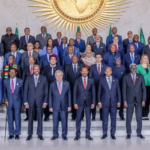In a significant response to the climate emergency, Malawi has proclaimed a state of disaster in 23 of its 28 districts due to severe El Niño-induced dry spells. On March 23, President Lazarus Chakwera declared that these harsh conditions have impacted two million farming households, leading to an urgent need for food aid.
This announcement was made alongside a food distribution event conducted by the World Food Programme and the Department of Disaster Management Affairs in the Neno district, which is located in the southern part of the country.
Manes Kanjala, a local farmer benefiting from the aid, expressed the gravity of the situation: “I have a big farmland, over an acre and a half in size. Usually, with ample rainfall, I gather between 20 to 50 kilograms of maize in bags. Sadly, this year I’ve harvested nothing.”
The reduced rainfall in December following an initially promising November has led to devastating crop failures. “The scorching sun has burnt the entire field and the crops,” Kanjala added, illustrating the harsh impact of the climate event.
Brighton Mphinga, the Disaster Risk Management Officer for Neno district, expects an increase in humanitarian support following President Chakwera’s statement. “The president’s declaration is a call to action, signaling the need for additional support to augment the government’s efforts,” Mphinga stated, emphasizing the urgent need for assistance.
The Presidential Initiative to Stop Hunger has been put forward to mobilise both local and international resources. With an estimated requirement of 600,000 metric tons of food aid, over $200mill of humanitarian assistance, the call for support is critical. Malawi’s plea comes in the wake of recurrent extreme weather events, echoing a similar crisis in neighbouring Zambia, which declared a national disaster in late February.










